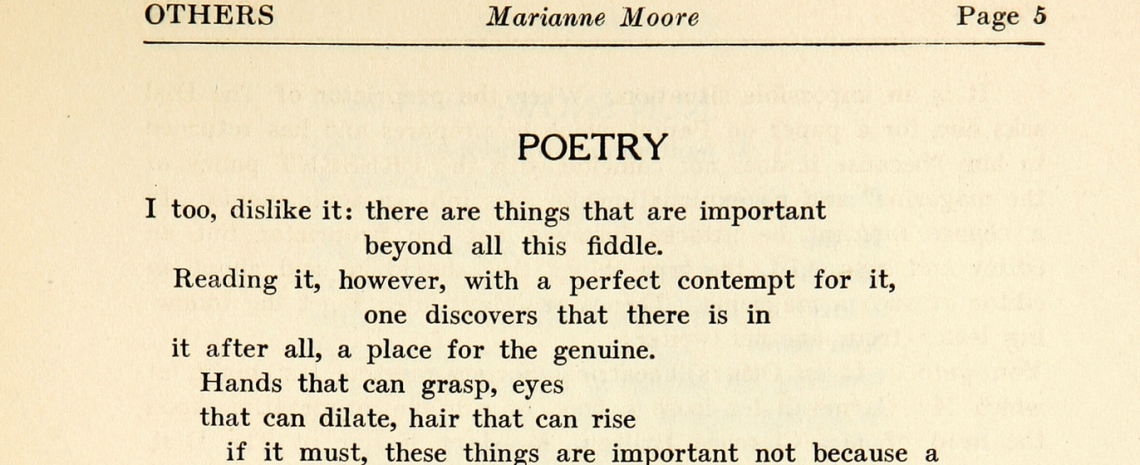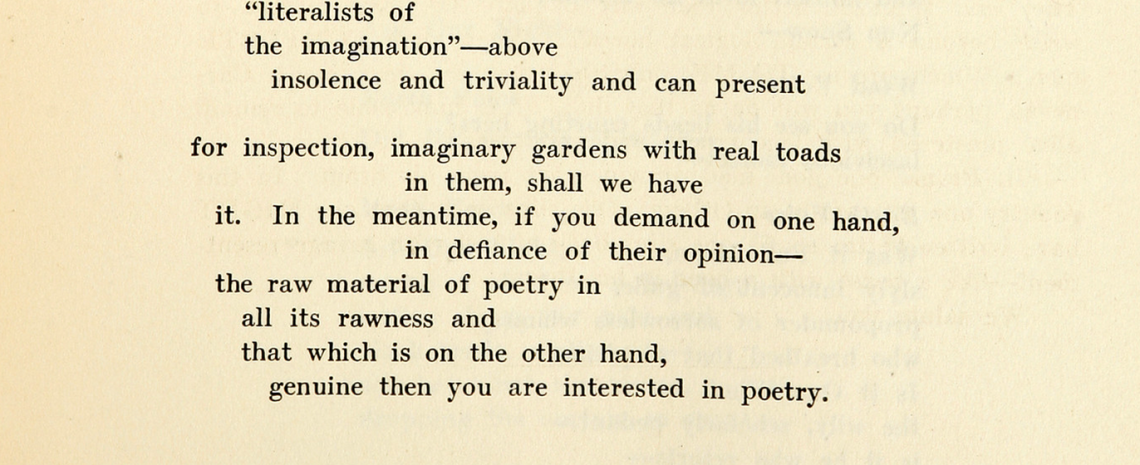In the meantime, if you demand on the one hand,
The raw material of poetry in
all its rawness and
that which is on the other hand
genuine, you are interested in poetry.— “Poetry” by Marianne Moore from Observations (1924)
Hello, scholars, surfers, and readers.
First: The Elevator Spiel
I am a second-year PhD candidate at the University of Victoria, studying the poetry of American women writers in relation to the language of science and the emergence of environmentalist rhetoric in the early-to-mid twentieth century. My CGS SSHRC-funded dissertation will focus on the triumvirate of Marianne Moore, Elizabeth Bishop, and Sylvia Plath. Additionally, I am researching digital humanities projects in the Maker Lab and Electronic Textual Cultures Lab (ETCL). My work in the Maker Lab springs from two research initiatives based at the University of Victoria: The Modernist Versions Project (MVP) and Implementing New Knowledge Environments (INKE). I’m curious to examine how digital environments mobilize data and make accessible resources and research in the humanities. I am investigating how digital tools lend to the research of modernist studies and book history.
Further: Projects in the Making and Doing
Currently I am analyzing the implementation of RDF and Linked Data in humanities projects. Linked Data is a method of publishing structured data that emphasizes the interconnected relationships amongst the data. Most basically, it connects heterogeneous sets of data for users to query. Projects such as Linked Jazz and Out of the Trenches: Linked Open Data of the First World War digitize archival materials and provide users with visualization tools to explore the data.
In light of these initiatives, I return to the questions: How do Linked Data projects produce research? How do the visualizations of Linked Data (as in the case of, say, the network of musicians in Linked Jazz) not only organize data, but also inform scholarship? What happens when historical and cultural information is translated into Linked Data? Furthermore, I’m interested in examining what these endeavours offer and/or obscure in order to consider how the Routledge Encyclopedia of Modernism, edited by Stephen Ross at the University of Victoria, may deploy metadata and RDF ontologies for scholarly use.
The Modernist Versions Project has embarked on the testing and reviewing of versioning programs as tools for studying the multiple versions and publication histories of modernist texts. The MVP dovetails with my own scholarly interest in the history of publication of Marianne Moore’s poetry. As a severe editor, Moore has left behind a rich and multi-formed body of work that serves as an exemplum for the study of versioning. What do these various incarnations of her poetry tell us about the poet’s form as it mutates over the decades? Which versions of her poetry were accessible to her peers, fans, and protégés at various points in time? Can we access and assess the younger Moore’s poetic ethos and style through these versions?
As you can see my work in the Maker Lab these past few weeks has spurred mostly rough, raw questions. I’m intrigued not merely by what digital humanities can bring to literary criticism, but hopeful about how those trained in literary criticism can contribute to digital scholarship and debates concerning the translation and representation of cultural artifacts in digital environments.
Many questions,
Adèle
Post by Adèle Barclay, attached to the ModVers project, with the versioning tag. Featured images of Marianne Moore’s “Poetry” care of Others 5.6, New York: William C. Williams, 1919-07, digitized by the Modernist Journals Project at Brown and Tulsa.


